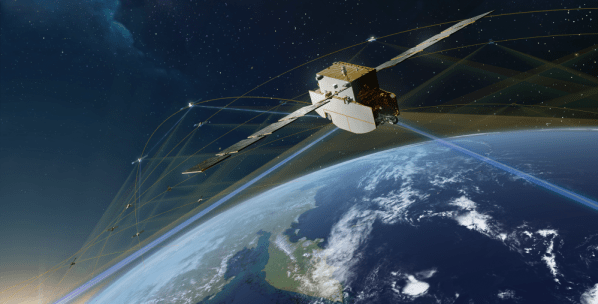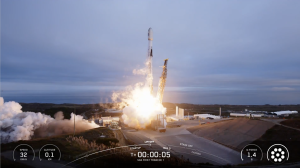SDA establishes pool of 19 vendors for future space demonstration projects

The Space Development Agency has tapped 19 space companies to compete for upcoming prototype demonstrations under its new Hybrid Acquisition for Proliferated Low Earth Orbit (HALO) vendor pool, the organization announced Wednesday.
As part of the HALO pool of pre-approved vendors, the selected businesses will now be able to compete for demonstrations and experimentation task orders that will support future tranches of SDA’s Proliferated Warfighter Space Architecture (PWSA). Each company has received an other transaction agreement (OTA) with an initial $20,000 to compensate for administrative and other expenses, according to the agency.
HALO task orders will focus on “rapid end-to-end mission demonstrations with launch of two identical satellites 12-18 months after award,” according to SDA.
The first prototype orders for HALO will be for the Tranche 2 Demonstration and Experimentation System (T2DES) project — intended to augment the Tranche 2 transport layer of communications and data relay satellites by demonstrating proliferation of future tactical data links and optical communications missions.
“Through HALO, SDA has an even faster and more flexible contracting mechanism in place to compete and award T2DES and other SDA demonstration projects,” SDA Director Derek Tournear said in a statement. “We believe HALO will also increase the pool of performers capable of bidding on future SDA programs, including participation in layers of future tranches.”
The PWSA is expected to comprise hundreds of satellites in low-Earth orbit (LEO) that carry critical warfighting capabilities for data transport and missile defense missions. SDA is fielding the constellation in tranches. It plans to launch the first operational batch of satellites in early 2025, with each subsequent tranche going on orbit every other year.
The agency is also leveraging the PWSA to test out emerging capabilities on orbit through a range of experimental projects, including T2DES and the Fire-control On Orbit-support-to-the-war Fighter (FOO Fighter) program, among others.
Although SDA has not shied away from giving contracts to defense space newcomers, many of the awards for the PWSA have gone to well-known players like Lockheed Martin and Northrop Grumman. On the other hand, HALO looks to open doors for non-traditional and commercial companies to work with the agency and mature their technologies.
The companies chosen for the initial HALO vendor pool are: Airbus U.S. Space & Defense; Apex Technology; ST Space Mobile USA; Astro Digital; Capella Space; CesiumAstro; Firefly Aerospace; Geneva Technologies; Impulse Space; Kepler Communications; Kuiper Government Solutions; LeoStella; Momentus Space; Muon Space; NovaWurks; SpaceX; Turion Space; Tyvak Nano-Satellite Systems; and York Space Systems.
Only firms that have been selected to participate in the vendor pool will be able to compete for the prototyping efforts under HALO. SDA expects to award multiple contracts each year for the effort and will review the pool periodically, according to the agency.






